Fentanyl Withdrawal: Timeline, Symptoms, & Treatment
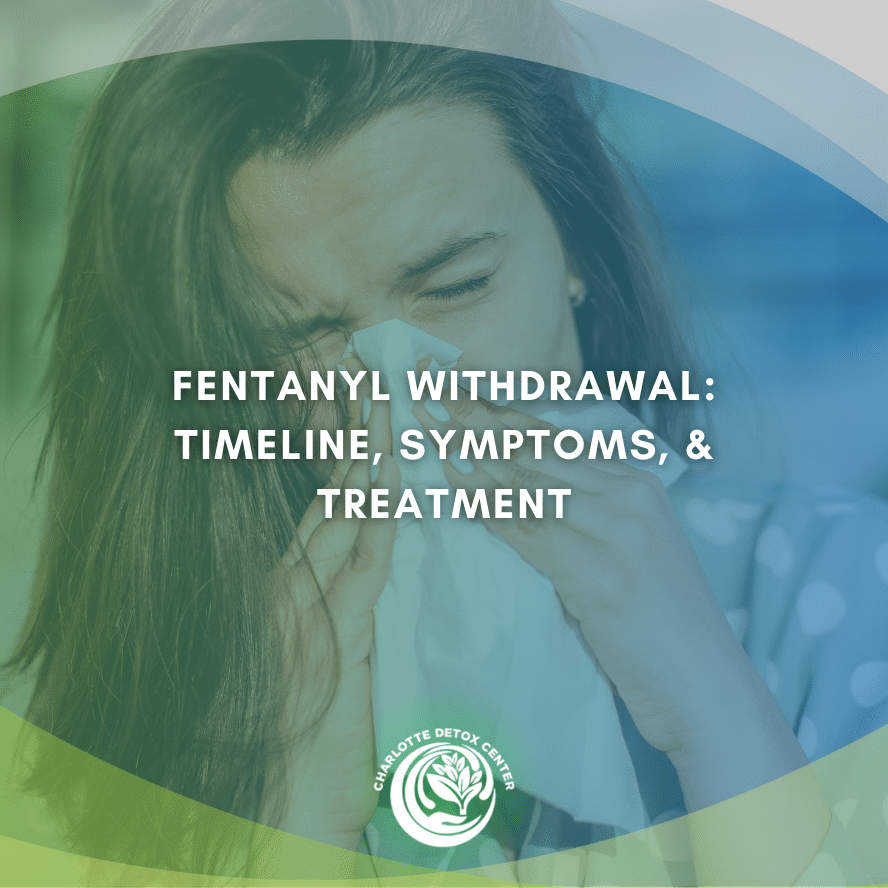
Medically Verified: 2/1/24
Medical Reviewer
Chief Editor

All of the information on this page has been reviewed and verified by a certified addiction professional.
According to the United States Drug Enforcement Administration (DEA), “Fentanyl is a synthetic opioid that is 80-100 times stronger than morphine. Pharmaceutical fentanyl was developed for pain management treatment of cancer patients, applied in a patch on the skin.”[1]
While fentanyl was created as a pain management medication, this drug is commonly manufactured illicitly and mixed into other substances. Oftentimes, individuals purchasing heroin will receive heroin that is laced with fentanyl. While this most commonly occurs with heroin, the United States is seeing rises in fentanyl-laced Xanax, methamphetamine, cocaine, and various forms of opioid pills.[2]
When someone takes a drug that is laced with fentanyl, they are likely to experience a life-threatening overdose. This is because fentanyl is an extremely potent substance. While most people accidentally consume fentanyl, some individuals begin to take this drug when they become tolerant of heroin or other potent opioids.
Fentanyl addiction is extremely dangerous, producing many life-threatening effects. One of the most difficult parts of overcoming fentanyl addiction is overcoming withdrawal. Because of this, individuals struggling with fentanyl addiction require professional detox and addiction treatment. A medical detox center can help patients cope with fentanyl withdrawal safely.
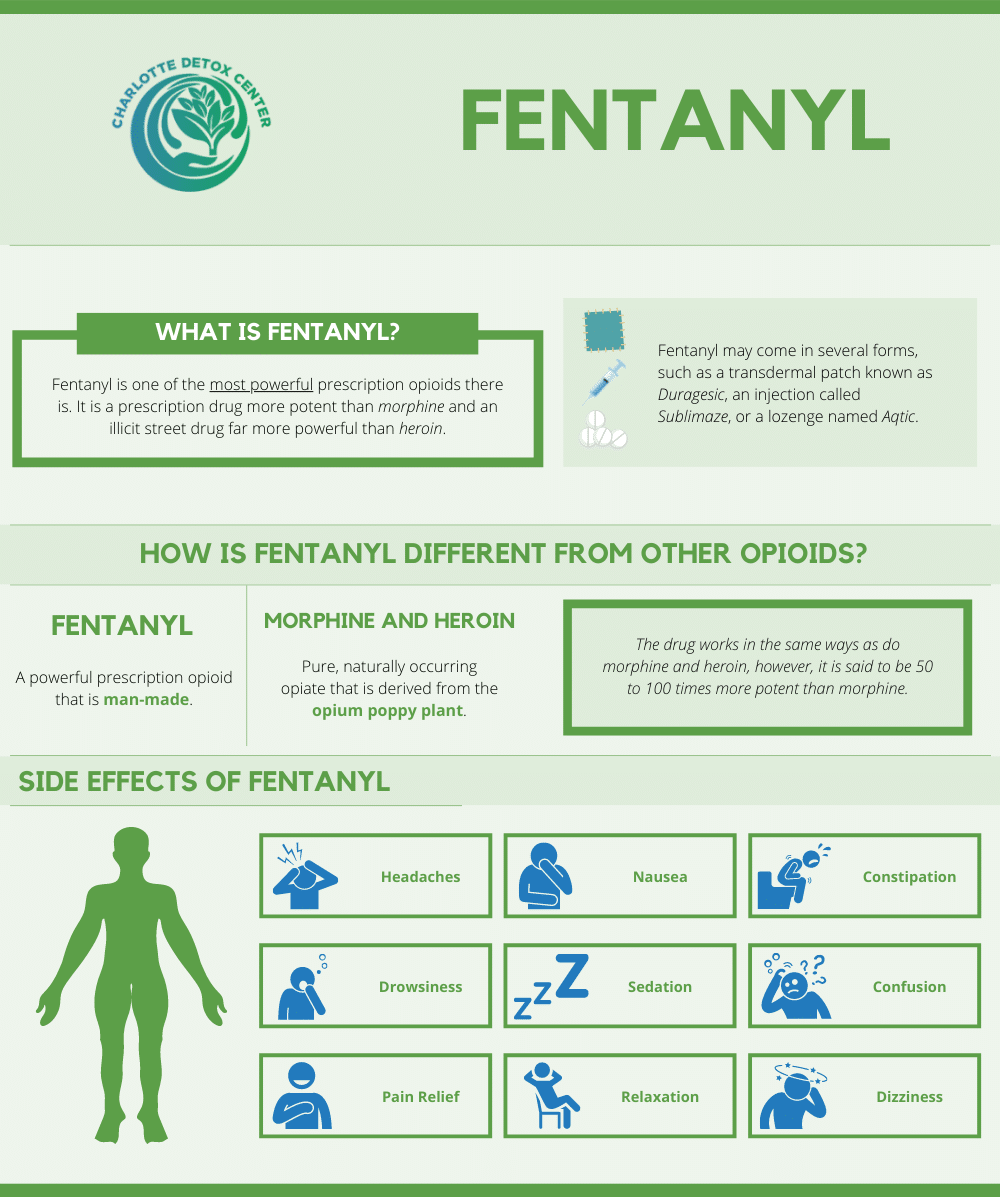
The Symptoms of Fentanyl Withdrawal
When someone is addicted to a substance and abruptly stops taking it, they will experience symptoms of withdrawal. This happens because their body has become accustomed to the presence of the substance. When the substance is no longer there, their body begins to go haywire.
The symptoms of fentanyl withdrawal are similar to other forms of opioid withdrawal. However, because fentanyl is much stronger, the withdrawal symptoms will be more pronounced. According to the FDA, the common symptoms of fentanyl withdrawal include:[3]
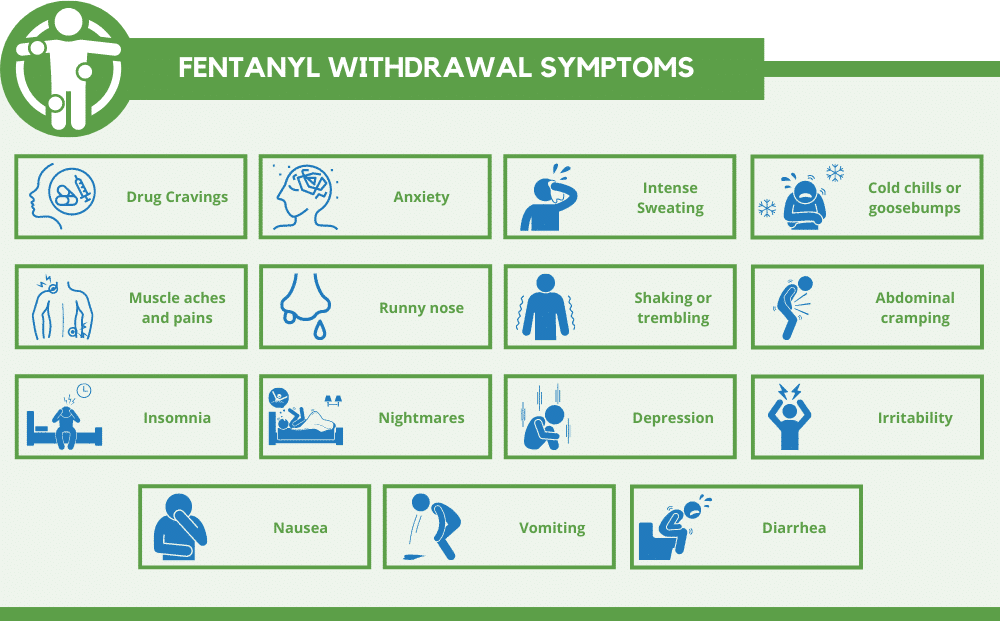
- Excessive yawning
- Chills or sweating
- Lacrimation (watery eyes)
- Pupil dilation
- Rhinorrhea (runny nose)
- Piloerection (body hair standing on end)
- Back pain
- Pain in the joints or muscles
- Stomach cramps, nausea, or vomiting
- Insomnia
- Anorexia
- Increased blood pressure, respiratory rate, or heart rate
- Anxiety
The symptoms of withdrawal must be treated by a professional medication-assisted detox program.
The Timeline of Fentanyl Withdrawal
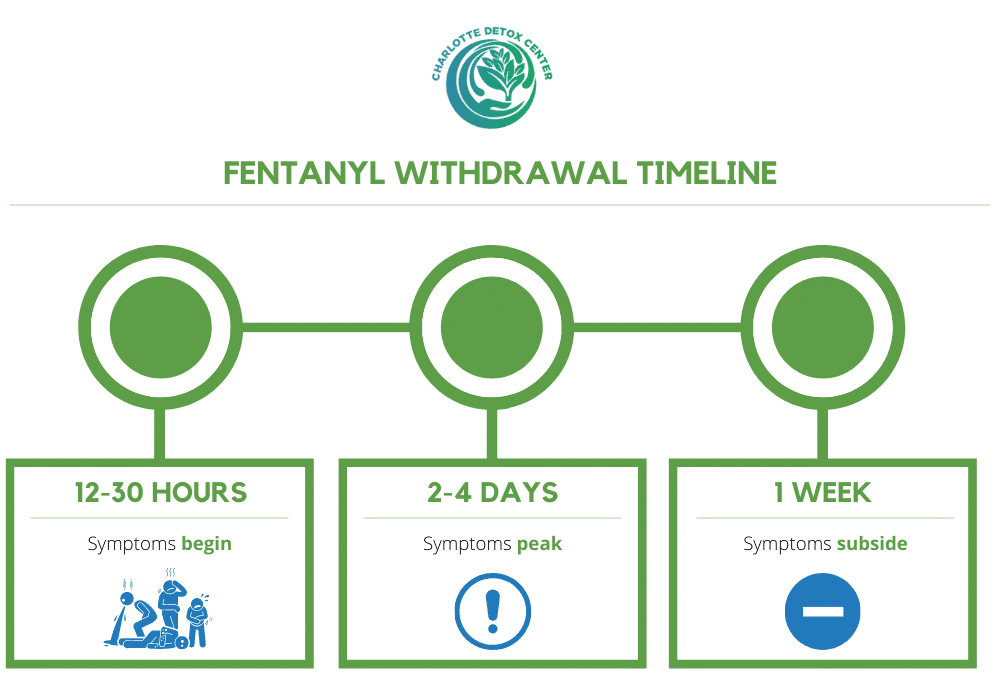
The fentanyl withdrawal timeline varies from person to person, depending on numerous factors. Some of those factors include how long the individual has been addicted to the drug and specifics of the individual’s genetic makeup (age, weight, overall health, etc.).
However, there is a general timeline to be aware of when it comes to fentanyl withdrawal. Withdrawal symptoms typically begin anywhere from 12-30 hours after the individual’s last dose. However, if an individual was abusing fentanyl patches, this could take much longer. This is because fentanyl patches are extended-release, meaning the effects last anywhere from 12-72 hours.
The peak stage of withdrawal is the period in which symptoms are at their worst. This usually occurs 2-4 days after withdrawal symptoms begin. Once the peak stage is over, symptoms of withdrawal usually subside within a week.
However, certain withdrawal symptoms such as drug cravings and other psychological symptoms may linger for weeks. This is why medication-assisted detox and treatment (MAT) is vital for individuals recovering from any type of opioid addiction.
Treating Fentanyl Withdrawal and Addiction: Medication-Assisted Treatment (MAT)
The treatment of fentanyl withdrawal must be done professionally in a medical setting. Typically, opioid withdrawal is treated in a medication-assisted detox program. It is important to note that fentanyl withdrawal should never be attempted at home, as symptoms may be life-threatening.
FDA-Approved Medications
FDA-approved medications will be utilized during detox to soothe the symptoms of withdrawal. These medications include methadone and buprenorphine (partial opioid agonists) as well as medications that treat high blood pressure (clonidine and lofexidine). Medications like methadone and buprenorphine bind to opioid receptors in the brain. This causes a small release of endorphins, lessening the symptoms of withdrawal and allowing the patient to taper off of fentanyl.
Additionally, some patients may use medications after fentanyl detox is completed. This is done to prevent fentanyl cravings, as well as prevent relapse by blocking the effects of opioids. The medications used during this stage of MAT are methadone, buprenorphine, and naltrexone.
Patients utilizing MAT treatment can expect 1 to 2 years of medication management and evidence-based therapies. Some patients may continue taking medications indefinitely.
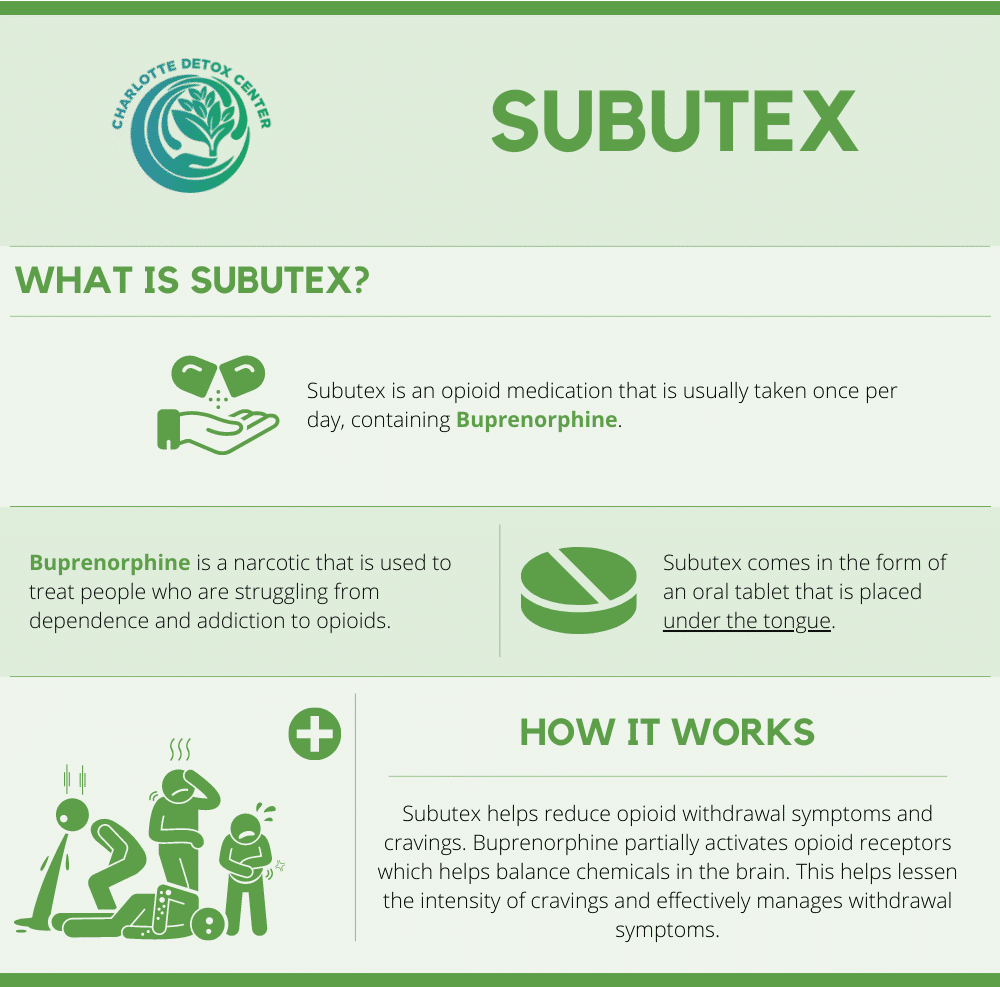
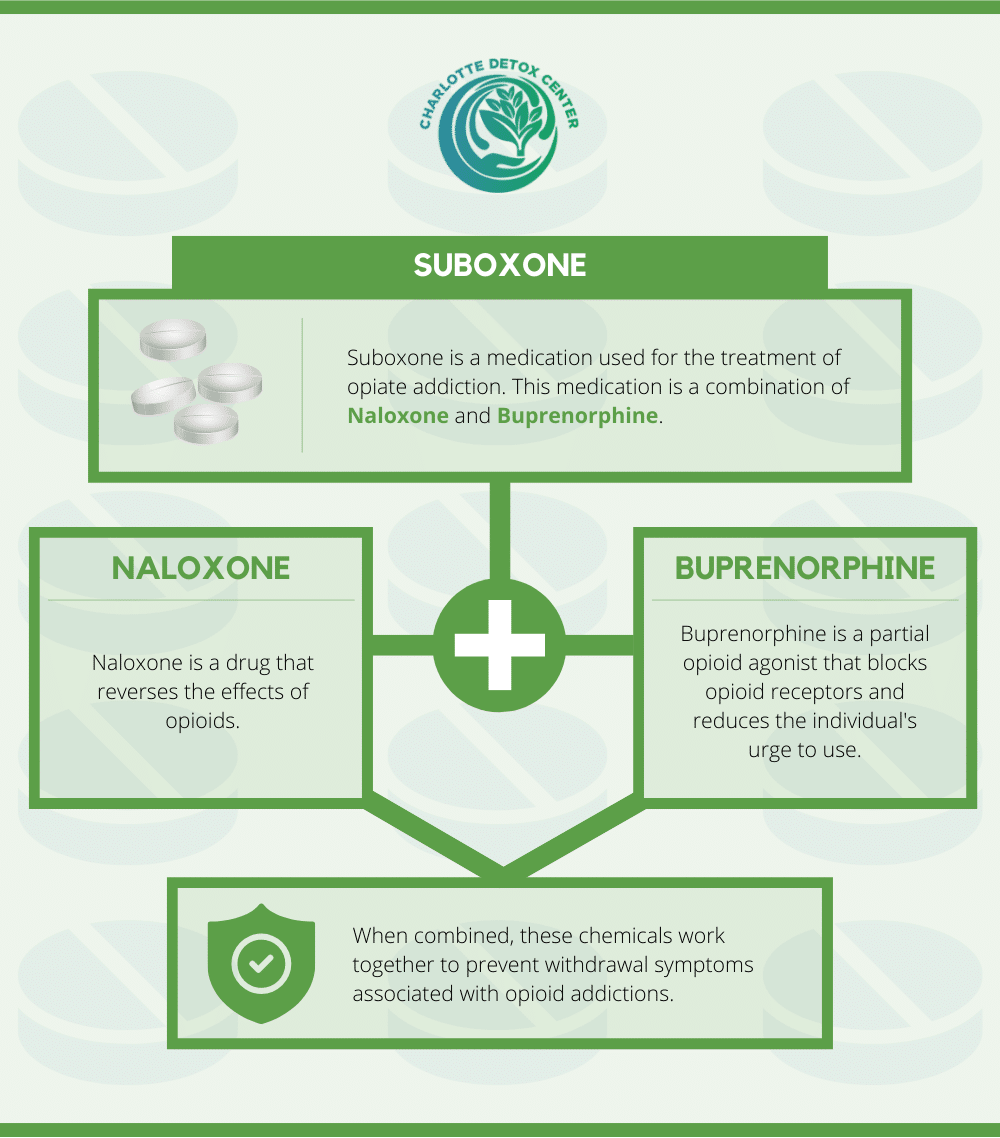
Behavioral Therapy
A vital aspect of medication-assisted treatment is behavioral therapy. While the MAT medications are effective in preventing relapse, the ultimate goal is sobriety. Behavioral therapy addressed the underlying causes and effects of addiction, reducing the patient’s need for maintenance medications.
Common therapies used during medication-assisted treatment for fentanyl addiction include:
- Cognitive Behavioral Therapy (CBT)
- Dialectical Behavior Therapy (DBT)
- Motivational Interviewing (MI)
- Contingency Management (CM)
- 12-Step Facilitation Therapy
- The Matrix Model
- Family Behavior Therapy
Attend a Fentanyl Detox Program at Charlotte Detox Center
Fentanyl addiction is a serious condition that requires intensive professional treatment. Individuals who decide to quit taking fentanyl should always attend a medication-assisted detox program like Charlotte Detox Center. By combining FDA-approved medications and behavioral therapy, our program sets patients up for success in recovery. Contact us today for more information on fentanyl withdrawal treatment and recovery.
References:
